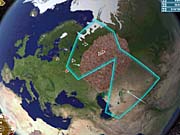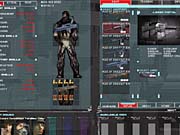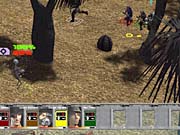UFO: Aftermath Preview
Will ALTAR Interactive's upcoming strategy game be a worthy successor to X-COM? Take a closer look at UFO: Aftermath.
X-COM: UFO Defense is widely considered to be a computer-game classic. Though the game's premise--fighting off an alien invasion--might have seemed extremely cliché, its inventive combination of tactical combat and addictive technology research wasn't. In the game, your squad of soldiers would carefully crawl through the ruins of the besieged planet in search of a variety of alien enemies to clear out. Once you had gunned down your extraterrestrial foes, you could then collect bits and pieces of alien technology and use them to research upgrades for your existing weapons and armor or to research completely new items for use in battle. UFO Defense was the start of a series of X-COM games, but none really recaptured the magic of the original game.

Some years later, the developer of X-COM began work on The Dreamland Chronicles: Freedom Ridge, a new game inspired by X-COM, but the game was canceled and changed hands many times until it ended up in the care of Czech developer ALTAR Interactive and was renamed "UFO: Aftermath." After all the false starts and delays, the game is finally well on its way to completion. We recently had the opportunity to try out an early version of the game.
UFO: Aftermath takes place on a futuristic version of Earth overrun by aliens. However, in the new game, you must also combat a new threat known simply as "the biomass." The biomass is a bizarre and humongous alien growth pattern that corrupts everything it touches and aggressively expands over the course of the game--the ultimate goal of this mysterious new threat seems to be blanketing Earth completely, and if it succeeds, you'll lose the game. To counteract this threat, you must build antibiomass facilities, which push the alien growth back. However, you can't build an infinite number of bases, since you must successfully clear out alien entrenchments at flashpoints all across the globe and research certain levels of technology in order to expand your own holdings. In addition, you can't succeed by building nothing but biomass bases, since you'll also need to fortify your holdings with other types of bases, including research facilities to improve your ability to research alien technologies and military bases to increase your military power.

You'll begin the game from a global view of Earth that shows your own pitifully small area of influence around your two starting bases. From this screen, you'll begin using UFO: Aftermath's unusual time-dilation system, which lets you pause the flow of time indefinitely or set it in motion on one of three speed settings (slow, normal, and fast), similar to Maxis' popular life-simulator The Sims. However, the flow of time in UFO: Aftermath tends to have much more dire consequences, especially if you get lax about letting Earth cycle through continuous days and nights until the biomass devours everything. However, as time passes, various events will occur, such as finding a new soldier to recruit, uncovering a new flashpoint to conquer, or completing your current research. The events are tracked in a ticker window that you can scroll through and peruse, but major events, such as uncovering a new battlefield, will give you the option to act on them.
You See a Bug Hole, You Nuke It!

In UFO: Aftermath, one of the most important events you'll see on the world map is the discovery of a new ally to add to your squad. The game will let you recruit a team of up to seven soldiers trained in various fields, including soldiering, science, and medicine. Each soldier will also have varying degrees of proficiency in four major skill sets: combat, defense, observation, and miscellaneous skills. Combat skills include each character's marksmanship, and they affect how proficient each character is with different weapons, including rifles, grenades, and handguns. Defensive skills include health, foot speed, dodging ability, and psi ability--you'll actually be able to research psionic upgrades for certain soldiers over the course of the game. Detection skills include both your character's power of observation (the ability to sight hidden enemies) and stealth, while miscellaneous skills encompass abilities such as carrying capacity and proficiency with med-kits. Throughout the early part of the game, your team will carry conventional, modern-day weapons such as Colts, Glocks, Desert Eagles, and Uzis, but as you recover corpses and equipment from the bodies of your alien foes, you'll be able to research powerful hybrid weapons that make use of both human and alien technology.
UFO: Aftermath will feature a streamlined research system that lets you unlock new tiers of technology once you've completely researched a certain number of more-basic advancements. One of the most important of these technologies will be UFO detection, followed by UFO entering, which you'll want to research early on to give your team the ability to detect and lay siege to enemy spacecraft that have landed on Earth. Some of the best technologies can be scavenged from such sites, but other upgrades will require actual alien body parts, which you can scavenge from doing battle with your enemies in any part of the globe. Once you meet all the requirements for the next researchable upgrade, all you need to do is visit the research screen, choose your next technology, and set it to research; after a certain amount of game time has elapsed, you'll complete your current project and move on to the next.
But while research can be handy and scouting out territory is crucial to your success, the core of UFO: Aftermath will be its tactical missions in which you actually lead your team into battle. You'll do so using the same time-dilation scheme used with the global map; you can give orders to your teammates and let them go in real time, or pause every step of the way, if you prefer. You can group-select your squad as you would in any other real-time strategy game, but UFO: Aftermath will actually show the destination of your team's movements each time you give them an order, and the game automatically queues up follow-up orders so that you can pause the game, order your troops to advance around to the side of a building and crouch, then split up your team to send half into unknown territory while ordering the rest to hang back and cover their comrades. Depending on how observant your team members are, they'll be able to sight hidden aliens from afar (or not see them until they're right behind you, as the case may be), at which point, the game goes into combat mode.

Your characters can be ordered to use the default attack with their current weapons, or fire in burst mode if available, as well as use miscellaneous items, such as grenades against aliens hidden in deep cover, or med-kits on wounded allies. Soldiers that sustain severe injuries will die unless treated by a comrade with medic skills. You'll want to make good use of the game's 3D terrain by taking the high ground against your enemies, which gives your soldiers a bonus in combat. However, these vantage points will constantly change with each map, since the game will feature a random map generator, just as X-COM did--and its 3D engine will be capable of rendering appropriate scenery for each region. For instance, if you accept a mission in the American Midwest, you'll find yourself in the middle of an industrial ruin littered with derelict cars and street signs for popular household products, whereas a mission in a wilderness area, such as the Rocky Mountains, will take place on a hilly region covered with spindly trees.
It's been a long time in coming, but UFO: Aftermath is finally coming together. But will it live up to the precedent set by X-COM? We'll find out when the game is released this September.
Got a news tip or want to contact us directly? Email news@gamespot.com
Join the conversation